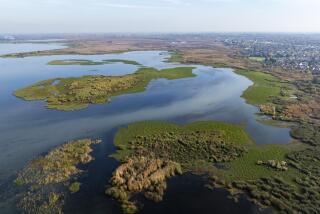Desalination isn’t the answer to California’s water problem
On Wednesday, the California Coastal Commission may green-light a massive desalination plant in Huntington Beach. If approved, it would be the second operation in the area. The nation’s largest seawater-to-drinking-water facility is under construction in Carlsbad and is expected to begin delivering a potable product in 2016.
Coastal Commission staff have recommended major changes to the proposed Huntington Beach plant to prevent marine life from being sucked up with the seawater. Staff estimate the ocean intake pipe could pull in some 80 million fish larvae, eggs and tiny sea creatures from about 100 miles of the coastline. They want the applicant, Poseidon Resources, to build an intake system under the sea floor that would gently pull water through a layer of sand, filtering out the marine life. Poseidon has said that would be too expensive and would effectively kill the project.
Here’s my recommendation. Shelve the proposal.
Ocean water desalination doesn’t pencil out. It’s far too expensive to produce potable water from seawater — about $2,000 an acre foot, compared to about $1,000 an acre foot for imported water. It requires a tremendous amount of energy to purify saltwater. And there are potentially serious environmental impacts from sucking in millions of gallons of ocean water and pumping the leftover brine back into the ocean.
That’s why Long Beach shelved plans for a desalination project with the Los Angeles Department of Water and Power. It’s a lot cheaper to conserve water or recycle it.
In fact, Orange County has a model water recycling operation down the road in Fountain Valley, where sewage water is purified in a treatment plant and then pumped to large ponds to percolate into the groundwater supply. This costs about $900 an acre foot and uses one-third the amount of electricity of a desalination plant, according to the Orange County Water District. And it reuses wastewater rather than sticking a straw in the ocean.
Climate change will affect the reliability of California’s water supply. Utilities throughout the state should be thinking about how to use less water imported from Northern California and the Colorado River, and developing “homegrown” water through recycling and conservation. Desalination should be a last resort.
ALSO:
Jonathan Martin shows us how a real man acts
Lesson of Typhoon Haiyan: Tackle climate change, or it will tackle us
When a cyclist is killed, why does the driver get the benefit of the doubt?
Follow Alexandra Le Tellier on Twitter @alexletellier and Google+
More to Read
A cure for the common opinion
Get thought-provoking perspectives with our weekly newsletter.
You may occasionally receive promotional content from the Los Angeles Times.







